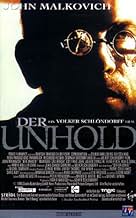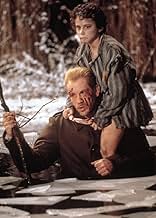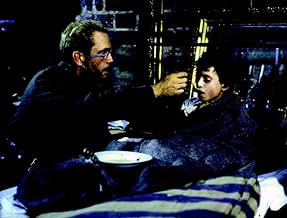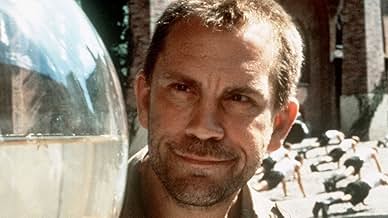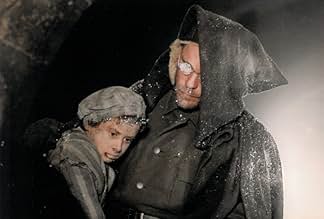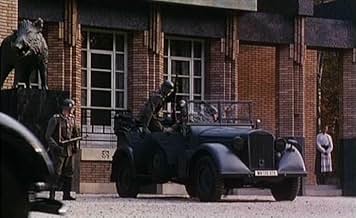Frenchman Abel Tiffauges likes children, and wants to protect them against the grown-ups. Falsely suspected as child molester, he's recruited as a soldier in the 2nd World War, but very soon... Read allFrenchman Abel Tiffauges likes children, and wants to protect them against the grown-ups. Falsely suspected as child molester, he's recruited as a soldier in the 2nd World War, but very soon he is taken prisoner of war. After shortly serving in Goerings hunting lodge, he becomes ... Read allFrenchman Abel Tiffauges likes children, and wants to protect them against the grown-ups. Falsely suspected as child molester, he's recruited as a soldier in the 2nd World War, but very soon he is taken prisoner of war. After shortly serving in Goerings hunting lodge, he becomes the dogsbody in Kaltenborn Castle, an elite training camp for German boys. Completely happ... Read all
- Director
- Writers
- Stars
- Awards
- 1 win & 1 nomination total
- Director
- Writers
- All cast & crew
- Production, box office & more at IMDbPro
Featured reviews
A great deal of the film is artfully done, with many subtle displacements to stimulate emotions in the viewer. Although the oft-mentioned 'front line' is never seen, instead we are faced with the massacre of hundreds of wild animals. The childhood friend of Abel returns to him in the form of the military official in the forest, and yet, Abel does not make a connection beyond a vague similarity. He is oblivious to the extravagant decadence of dipping one's hands in jewels, or keeping a wild cat for pleasure. In his simpleton's way he meanders through a landscape of potential knowledge, yet learns nothing. It is the viewer who is given the chance to learn what he can't. Unfortunately, this schema reminded me a bit too much of Forrest Gump. However, the film speaks a great deal to the fairy-tale effects of idealism and propaganda on young children, as finally Abel is cut off by the very boys he loved, their allegiance to a greater unseen force much stronger than their understanding of fellow man.
A brilliantly scripted film (filmed in English despite the foreign origin). A must see. It saddens me, though that it is so difficult to find, and that it was never released in the US (as far as I know).
-jjj
During Hitler's Putsch in 1923, Goring sustained a painful injury whose relief by means of morphine turned him into a drug addict nearly the rest of his life. This influence, in turn, made him "alternately elated or depressed; he was egocentric and bombastic, delighting in flamboyant clothes and uniforms, decorations, and exhibitionist jewelry." We see all these traits in Spengler's scenes, e.g. in his drunken alternation between a tirade and a blue funk at the fact that someone else had shot a stag that he wanted to shoot. When a soldier enters to bring him some really bad news, Goring is already so gloomy that he barely raises his hand from the table to salute, and his "Heil Hitler" is just a slurred grunt.
The article also establishes his corpulence and luxuriousness, to a point resented by his colleagues in the party. "His hunting interests enabled him to obtain a vast forest estate in the Schorfheide, north of Berlin, where from 1933 he developed a great baronial establishment" called Carinhall, full of artistic war booty, to which he retired whenever he could.
The film showed Goring as an often jovial man given, like Hitler, to occasional fits of imperious screaming. This behavior, according to one book I read recently, was to be expected of any top leader of the Third Reich not merely as a habit but as a deliberate technique. People outside of Germany were slow to take Hitler seriously as a threat because this conduct was so strange to them. They did not realize that German culture of the time regarded it as a standard part of the fatherly role. Therefore, as Hitler understood well, the more he screamed and shouted at his countrymen, the more closely they would identify him as a father figure and the embodiment of Der Vaterland.
Many superstitious beliefs have been associated with precious stones. The novel explains that Goring was not unique in imagining that plunging his fingers into a bowl of gems would drain away nervous energy and uncomfortable emotions. Other sources recount that when Hugo von Hofmannsthal's first poems appeared, under a pseudonym, they were so heavy with sensuous Weltschmerz that one critic declared they must have been written by an opulent old man while dipping his fingers in jewels. (He would soon be surprised that the poet was still a youth). So even this strange indulgence of Goring is in keeping with the ambient culture among those few who could afford the experience.
One could say much, much more about this complex film, but perhaps this elucidation of just one minor aspect suggests the multilayered care with which it has been put together.
Did you know
- TriviaGerard Depardieu was slated for the lead role
- GoofsPrior to the school fire, a caption says "Paris 1925". Upon his arrest as an adult, Abel, through his narration, remembers the fire as having happened "twenty years ago". This would place his adult scenes in 1945, but when he joins the French army after his arrest it is before the German occupation of Paris which would place his arrest in 1940. However, Abel is slow-witted and possibly does not have an accurate sense of time.
- Quotes
Count von Kaltenborn: This whole beautiful country, to which we have given our souls, is utterly doomed. It's going to be wiped out of human memory. Our entire heritage, even our name, our ancestors' names, wiped out, all wiped out!
- ConnectionsFeatured in Hollywood Profile: John Malkovich (1998)
- How long is The Ogre?Powered by Alexa
Details
- Release date
- Countries of origin
- Languages
- Also known as
- The Ogre
- Filming locations
- Production companies
- See more company credits at IMDbPro
Box office
- Gross US & Canada
- $50,935
- Gross worldwide
- $50,935
- Runtime1 hour 58 minutes
- Color
- Sound mix
- Aspect ratio
- 1.85 : 1
Contribute to this page


